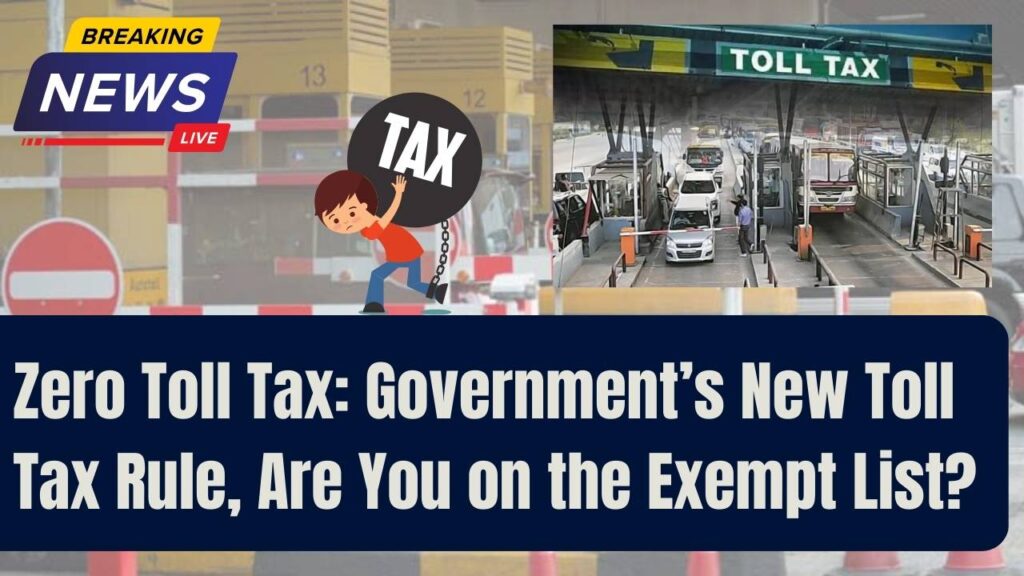Zero Toll Tax – The Indian government has introduced a Zero Toll Tax policy, offering exemptions to specific individuals, vehicles, and organizations. If you frequently travel on national highways, this new rule could save you time and money. But who qualifies for toll tax exemption? Let’s break it down in simple terms.

Before diving into the details, let’s look at the key highlights.
Zero Toll Tax
| Topic | Details |
|---|---|
| Policy Name | Zero Toll Tax Rule |
| Implemented By | Ministry of Road Transport and Highways (MoRTH) |
| Eligible Vehicles | Government officials, emergency services, specific dignitaries, etc. |
| FASTag Requirement | Required for seamless passage |
| Official Website | MoRTH Website |
| Implementation Date | 2024 |
| Verification Method | FASTag-based electronic validation |
| Penalty for Misuse | Heavy fines and revocation of exemption |
The Zero Toll Tax policy aims to simplify and speed up highway travel for essential vehicles. If you qualify for an exemption, ensure you have a valid FASTag and proper documentation to enjoy toll-free travel. Misuse of exemption privileges can lead to heavy fines and legal consequences
Understanding Toll Tax Exemption
Toll tax is a fee collected on highways to maintain and develop road infrastructure. However, the government has identified certain individuals and vehicles that are exempted from paying tolls.
Who is Exempt from Toll Tax?
As per the National Highways Fee (Determination of Rates and Collection) Rules, 2008, the following categories qualify for toll tax exemption:
1. High-Ranking Government Officials
The government has granted toll exemptions to several high-ranking officials and dignitaries, including:
- President and Vice-President of India
- Prime Minister
- Governors of States
- Chief Ministers and State Cabinet Ministers
- Judges of the Supreme Court and High Courts
- Members of Parliament (MPs) and Members of Legislative Assemblies (MLAs) (within their state of representation)
- Chief Secretaries and Secretaries to the Government of India
2. Defense and Law Enforcement Vehicles
- Indian Army, Air Force, and Navy vehicles
- Paramilitary forces (CRPF, BSF, ITBP, CISF, etc.)
- Police vehicles on duty
- Fire-fighting vehicles
3. Emergency and Essential Services
- Ambulances transporting patients
- Funeral vans
- Vehicles specially designed for persons with disabilities
4. Official Vehicles Used for Highway Maintenance
- National Highways Authority of India (NHAI) vehicles
- Government vehicles assigned for highway inspection, construction, or maintenance
5. Public Transport and Utility Services
- State-run buses operating under public transport schemes
- Utility service vehicles such as water supply, electricity maintenance, and disaster response teams
How to Apply for Toll Tax Exemption?
If your vehicle falls under the exemption list, follow these steps:
Step 1: Get an Official FASTag
Even exempted vehicles require an official FASTag for seamless toll plaza entry. This can be obtained from NHAI or authorized banks like SBI, ICICI, and HDFC.
Step 2: Submit Required Documents
You’ll need to provide:
- Vehicle registration certificate (RC)
- Government-issued ID proof
- Authorization letter from the relevant department
- Certification of exemption eligibility from MoRTH
Step 3: Approval and Activation
Once verified, your FASTag will be activated for toll-free passage. Ensure that it is properly installed on your vehicle’s windshield.
Step 4: Periodic Verification
Government authorities will periodically check the validity of exemptions. Misuse can result in fines and revocation of exemption privileges.
International Comparisons
Many countries have implemented toll tax exemption policies similar to India’s. For example:
- United States: Military and emergency vehicles are often exempt on federal highways.
- United Kingdom: Emergency services and government vehicles enjoy toll exemptions on certain bridges and tunnels.
- Germany: Some low-emission vehicles are given toll discounts as part of environmental policies.
These policies show how different governments balance revenue generation with essential services.
Real-Life Experiences & Testimonials
- “Being an ambulance driver, the toll exemption has significantly improved response times for emergencies.” – Ramesh K., Emergency Driver
- “Our state transport buses no longer have to wait in long queues, saving thousands in fuel costs.” – Rajiv S., Transport Manager
Penalties for Misuse of Toll Exemption
To prevent misuse, the government has introduced penalties for unauthorized use of exemption benefits:
- False Declaration: If a vehicle falsely claims exemption, it will be fined ₹10,000 per incident.
- Misuse of Exempt FASTag: The FASTag can be blocked permanently for unauthorized transfers.
- Legal Action: In severe cases, legal proceedings can be initiated under The Motor Vehicles Act, 1988.
Big Tax Relief for Seniors! How the New TDS Limits Help You Keep More Money
No More Hassle of Frequent FASTag Recharges! Government to Introduce a New Toll Tax Rule
TDS Payment Rules 2025: Deadlines, Compliance & How to File!
FAQs
Q1: Can I get a toll exemption if I am a regular traveler?
No, toll exemptions are only for specific categories of government officials, emergency services, and other eligible vehicles.
Q2: Do I need a FASTag even if my vehicle is exempt?
Yes, all vehicles—including exempt ones—must have a valid FASTag for easy verification and hassle-free passage.
Q3: How do I check if my vehicle is exempt?
You can visit MoRTH’s official website to check the latest exemption list.
Q4: What happens if an exempted vehicle doesn’t have a FASTag?
Without a FASTag, you might have to manually show documents at toll booths, causing delays.
Q5: Will exemption rules change in the future?
The government may update exemption policies periodically. Stay updated by visiting MoRTH’s official website.







